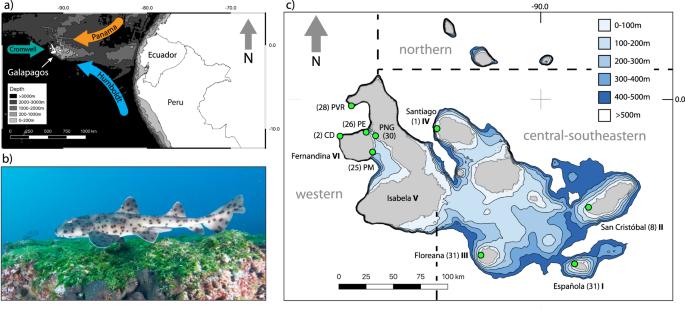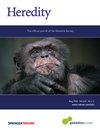What Darwin could not see: island formation and historical sea levels shape genetic divergence and island biogeography in a coastal marine species
IF 3.9
2区 生物学
Q2 ECOLOGY
引用次数: 0
Abstract
Oceanic islands play a central role in the study of evolution and island biogeography. The Galapagos Islands are one of the most studied oceanic archipelagos but research has almost exclusively focused on terrestrial organisms compared to marine species. Here we used the Galapagos bullhead shark (Heterodontus quoyi) and single nucleotide polymorphisms (SNPs) to examine evolutionary processes and their consequences for genetic divergence and island biogeography in a shallow-water marine species without larval dispersal. The sequential separation of individual islands from a central island cluster gradually established different ocean depths between islands that pose barriers to dispersal in H. quoyi. Isolation by resistance analysis suggested that ocean bathymetry and historical sea level fluctuations modified genetic connectivity. These processes resulted in at least three genetic clusters that exhibit low genetic diversity and effective population sizes that scale with island size and the level of geographic isolation. Our results exemplify that island formation and climatic cycles shape genetic divergence and biogeography of coastal marine organisms with limited dispersal comparable to terrestrial taxa. Because similar scenarios exist in oceanic islands around the globe our research provides a new perspective on marine evolution and biogeography with implications for the conservation of island biodiversity.

达尔文看不到的东西:岛屿形成和历史海平面决定了沿岸海洋物种的基因分化和岛屿生物地理学
海洋岛屿在进化和岛屿生物地理学研究中发挥着核心作用。加拉帕戈斯群岛是研究最多的海洋群岛之一,但与海洋物种相比,研究几乎都集中在陆地生物上。在这里,我们利用加拉帕戈斯牛头鲨(Heterodontus quoyi)和单核苷酸多态性(SNPs)来研究一个没有幼虫扩散的浅水海洋物种的进化过程及其对遗传分化和岛屿生物地理学的影响。单个岛屿从中心岛屿群中依次分离出来,逐渐形成了岛屿之间不同的海洋深度,这对 H. quoyi 的扩散构成了障碍。通过阻力分析进行的隔离表明,海洋水深和历史上的海平面波动改变了遗传连接。这些过程至少形成了三个遗传集群,它们的遗传多样性较低,有效种群大小随岛屿大小和地理隔离程度而变化。我们的研究结果说明,岛屿的形成和气候周期决定了沿岸海洋生物的遗传分化和生物地理学,其扩散范围有限,与陆生类群相当。我们的研究为海洋进化和生物地理学提供了一个新的视角,对保护岛屿生物多样性具有重要意义。
本文章由计算机程序翻译,如有差异,请以英文原文为准。
求助全文
约1分钟内获得全文
求助全文
来源期刊

Heredity
生物-进化生物学
CiteScore
7.50
自引率
2.60%
发文量
84
审稿时长
4-8 weeks
期刊介绍:
Heredity is the official journal of the Genetics Society. It covers a broad range of topics within the field of genetics and therefore papers must address conceptual or applied issues of interest to the journal''s wide readership
 求助内容:
求助内容: 应助结果提醒方式:
应助结果提醒方式:


